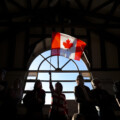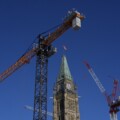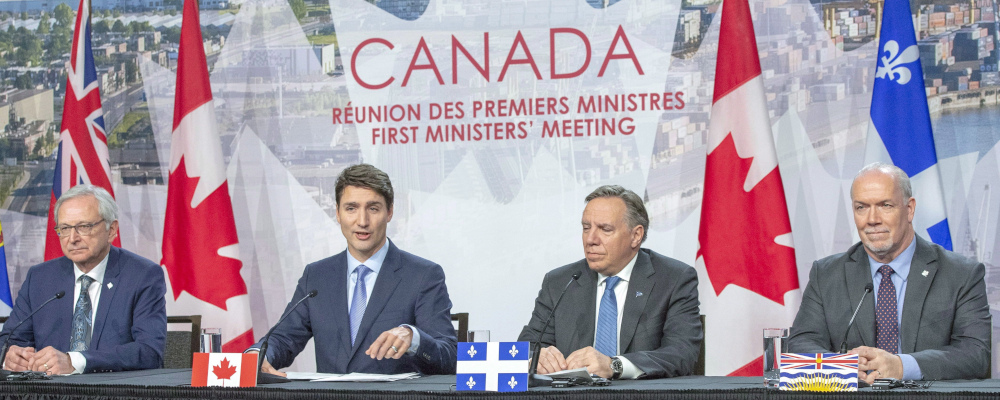It would be easy to conclude from the fact that Canadians just elected our fifth minority government in the last seven general elections that this is what most Canadians want. That may be true for some of the one-third of voters who backed minor parties with no expectation that they would form government, but it is not true for the other two-thirds who voted for a party with a realistic chance of winning a majority.
No one votes for a minority government. If many Canadians say they are OK with that outcome, it is likely because it is the second-best option after their preferred party winning outright and preferable to another party winning a majority.
The minority governments of 2019 and 2021 are the result of the Liberals and Conservatives being incapable of breaking an electoral deadlock. In both elections, the Conservatives narrowly won the national popular vote while the Liberal appeal to urban voters produced enough seats to beat the Conservatives convincingly, but not by enough for a majority.
This stalemate is real but it is also misleading as it obscures significant regional differences. It is not the case that Canadians are evenly divided across the country, but rather that imbalances across the country add up to the appearance of national balance. The variegated patchwork of the electoral map doesn’t lie.
We are a country of many solitudes. We are at least ten distinct regions, split by generation, and further diced, divided, and dissected along linguistic, religious, cultural, moral, rural/urban, and class lines. Pick two points on this multi-dimensional graph and the visions of Canada you see will be fundamentally incompatible and, in some cases, mutually incomprehensible.
At the extremes, in parts of the Prairies and Quebec, the differences are so great that one is tempted to conclude that it is not so much a matter of misunderstanding each other as no longer being interested in understanding each other. A federal government faced with such a polarised country must accept impotent gridlock or choose sides, further inflaming resentments.
Nor should we expect the situation to improve. It is not a coincidence that our politics is becoming more fractious at the same time as the economic and cultural assumptions that sustained our post-war consensus are eroding.
In his grim book-length essay, “On Decline,” Andrew Potter exposes this mental fatigue at the heart of Western society. According to Potter, since the 1970s, technological development has slowed, wages have stagnated, and our culture has retreated into commodified nostalgia. Meanwhile, our politics is increasingly shaped by the dynamics of social media which, lest we forget, are intentionally designed to split us into deaf, shrill, and suspicious online tribes and then keep us there.
Potter doesn’t spare his reader’s sensibilities. “Ask yourself,” he says, “what are the chances all of this is just a passing fad? We keep expecting things like the economy, the environment, and our birthrates, to fix themselves and go back to ‘normal.’ But it’s increasingly clear that what we thought was normal was actually anomalous. The only remaining question is what happens next.” It is a dark book for dark times, appropriate for the twilight of a Golden Age.
What does come next? My bet is on more of the same, but worse.
After the Golden Age comes the brief Age of Fool’s Gold, a crepuscular time when we continue to pretend that nothing has changed and we can still just about maintain the lifestyle of our parents by maxing out our credit cards. But, underneath, gnawing economic anxiety and a lack of shared cultural assumptions will heighten and harden our differences. We will become more distrustful of each other, more resentful of real and perceived biases within society and double standards within Confederation, which will encourage more political brinksmanship in a zero-sum competition for Ottawa’s favours.
We can expect Canadian politics to fracture further, with a superficial coherence sustained by provincial dependence on Ottawa, and specifically on the Treasury’s ability to print money. The pandemic has made it clear that our unifying national institution is no longer Parliament, but the Bank of Canada, before whose doors the premiers gather with their begging bowls like the ragged and parched desert dwellers of Mad Max: Fury Road, waiting for the water to flow from the Citadel. This is a form of national unity, but not a healthy one: it is unity by necessity.
While there is no reason that consecutive minority governments can’t continue to govern almost indefinitely under these conditions, that shouldn’t cause us to forget that they aren’t supposed to. Under the orthodox theory of Westminster democracy, minorities are supposed to resolve themselves into majorities over time as larger parties adapt and adjust to compete for the votes of smaller parties. This is what happened after Stephen Harper united the Canadian Alliance and Progressive Conservative parties. It is also, broadly, what the Liberal Party does in each election to keep the NDP at bay.
Regional parties confound this theory. In our system of representative government, the common good is supposed to be more than the sum of local considerations. It is something to be arrived at after deliberation by a body of local delegates, each with one eye on the needs of their constituents and the other on the national interest. But the theory doesn’t account for parties whose voters don’t care about the common good or whose leaders say things like: “what is good for Quebec will be supported by the Bloc Québécois; what is not good for Quebec will be fought by the Bloc Québécois.”
Interestingly, in that same election night speech, Blanchet also pointed to a possible way forward, one that doesn’t resolve our differences so much as make the best of them. After pledging himself to an uncompromising nationalist agenda, Blanchet added, almost as an afterthought, that it is “all the better if it also serves Canada’s provinces.” That Blanchet’s commitment to his own province is matched by his indifference to what happens in the others may mean that a renewed federalism is, if not quite our best hope, then our only option.
Canadian federalism — real federalism, not the mendicant federalism of thirteen premiers taking their begging bowls to Ottawa — was born out of the need to accommodate regional and cultural differences that predated the idea of a united Canada, differences that were accepted as intractable at Confederation and treated as desirable in our Constitution. The sources of our divisions today may be different and more complex, but the idea of separating federal and provincial powers to address them is still relevant. Federalism may not be a solution to our regional divisions — it is not supposed to be — but it is a viable coping mechanism. For now.
Writing in iPolitics during the federal election Alan Freeman, a former journalist and Department of Finance official, provided the definitive Ottawa critique of federalism: “According to Legault,” Freeman sniffed, “Ottawa has two purposes: to transfer powers to Quebec, or to hand it unlimited amounts of cash, with no strings attached. If you can get both at once, even better.” Although Freeman’s ostensible target was Quebec’s premier, his article is really an indictment of our constitutional system, which Legault understands better than Freeman.
The reason that the federal government can “hand” cash to the provinces is because it collects taxes for them at the same time it collects taxes for itself. But the fact that Ottawa collects taxes for the provinces is a matter of convenience, not a matter of constitutional import. “Handing” the money it collects on their behalf to the provinces to spend in areas of provincial jurisdiction is how constitutional federalism is supposed to work; attaching strings to that money to restrict provincial policy options in areas like childcare, housing, or healthcare violates the spirit of that constitutional arrangement.
Pierre Trudeau understood this, although his commitment to the principle was stronger before he entered politics. In a 1957 essay in Cité Libre, Trudeau surprised his readers by siding with Quebec Premier Maurice Duplessis against Prime Minister Louis St. Laurent’s decision to provide funds to provincial universities. In words that could grace a Fraser Institute report, Trudeau quoted a brief he had written for the Fédérations des Unions Industrielles du Québec saying that: “if a government has at its disposal such a surplus of funds that it can undertake to support a part of the common good that does not lie within its jurisdiction, one may suspect that this government controls more than its share of taxation.”
In a later essay on “The Practice and Theory of Federalism,” Trudeau returned to the theme. “Since regionalisms do exist in Canada,” he posited, “such feelings should be exploited to further the cause of democracy: each community might enter into a state of healthy competition with the others in order to have better ‘self-government.’” More recently, Carl Vallé, a former advisor to Stephen Harper, made a similar point when he described Harper’s successful accommodation of Quebec’s desire for provincial autonomy as “dictated by conservative logic: we believed it was the best way to make such a large and diverse country with competing regional interests’ function.”
This constitutional defence of federalism is subtly different from idea that federal systems create “laboratories of democracy” in which provinces can test different economic and social policies, with the others eventually adopting those that prove most successful. The “regionalisms” that Trudeau refers to presuppose that different provinces may have fundamentally different visions of the public good. The real virtue of federalism is not that it allows for policy experimentation, though it does, but that it does not impose a single vision of government on a diverse country.
A renewed federalism is not incompatible with a strong federal government, but it does remind us that a strong federal government does not need to be a large or intrusive federal government. It can be strong in the areas like defence and foreign policy where it needs to be to defend our common interests, and it can even invoke emergency powers in a crisis or use its criminal law, taxation, and trade and commerce powers to address common threats like climate change, but otherwise it should leave the provinces to shape their own economic and social policies without second-guessing or duplicating them.
The heirs of Pearsonian Liberalism and Diefenbaker’s “one Canada” Conservativism will no doubt bridle at this idea. It will sound to them like surrendering the idea of Canada as a country united from sea to sea under the billowing Maple Leaf (or Red Ensign, as the case may be). This was the atavistic emotional reservoir that Trudeau tried to tap into towards the end of the election. But as Jen Gerson wrote in the best English Canadian column about the 2021 election, “[r]ight down to the patronym, Trudeau’s appeal [was] a nostalgia for the pre-eminence of a plucky punch-above-its-weight nation that is long gone, or fading.”
In case the old guard hasn’t noticed, this is a different world and we are a different country, one far removed from the relatively homogenous Canada of the 1950s and 1960s in almost every conceivable way. You can’t transform a nation through policies of multiculturalism, regional development, Indigenous self-government, immigration, and the liberal individualism of the Charter and then turn around and demand that these newly empowered peoples keep their different views to themselves. Nor can you expect a diverse country spanning half a continent to accept a single idea of Canada dictated from the top floors of the concrete and glass towers of Ottawa and Toronto.
The nostalgists among our elites may see a recommitment to real federalism as a counsel of national defeat; I would encourage them to see it as coming to terms with a reality they helped create.
Recommended for You

‘A celebration of the spirit of Alberta’: Ryan Hastman on the political, economic, and cultural importance of the Calgary Stampede

‘Can we actually be an independent country?’: Michael Ignatieff on the 60th anniversary of Lament for a Nation

Fred DeLorey: Why the NDP may be in even bigger trouble than we think

DeepDive: Canada desperately needs its own Department of Government Efficiency—but one with a heart




